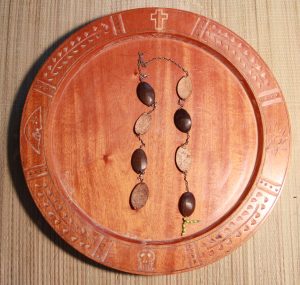 Some of you may have noticed that when I write about the stories (patakís, itan) and proverbs from Ifa odduns, I usually don’t mention the oddun by name. There are a couple of reasons for this.
Some of you may have noticed that when I write about the stories (patakís, itan) and proverbs from Ifa odduns, I usually don’t mention the oddun by name. There are a couple of reasons for this.
One: The odduns, and the information associated with them, traditionally are fully in the province of the babalawos alone. As I mention in my book Babalawo, Santeria’s High Priests, in the 1940s Pedro Arango published a book called Iwe ni Iyewó ni Ifá Orunmila, which gave detailed information on the odduns of Ifá. In his, “Words from the Author,” section prefacing the second edition of the book, Arango admitted copies of the first edition of the book had fallen into the hands of a woman, presumably a santera, and two obá oriatés. Arango wrote that to save his responsibility (and probably his reputation as well), he was publishing the greatly enlarged second edition using much tighter security: he put a different secret mark in each copy so that if that copy was found in a non-babalawo’s hands, they would immediately know exactly who had been the source of the leak. In addition, Arango threatened to publicly denounce any non-babalawo found to be in possession of the book to their elders. Obviously, it was considered sacrilege to santeros and babalawos alike or such a denunciation would not have been much of a threat. In fact, the accessing of books on Ifá odduns by non-babalawos is very likely to have played a major role in the frictions we see today between olorichas and
Two: I often see posts from people asking about an oddun get irresponsibly answered with a cut and paste of all the information from one of these books. I say irresponsibly, because these books are written in the form of notes and is meant to interpreted by an experienced babalawo according to the type of iré (blessings) or osobo (negativity) that the person came with as well as the Witness odduns, etc. Often there is information that will appear to be downright contradictory if you don’t understand how these odduns and these books work. An oddun can also take very, very different forms depending on what kind of iré or osobo the person has come with.
These books may have parts that speak of very dark events meant for the person who came with Ikú (Death) that wouldn’t apply to a person who came in iré or with one of the lesser types of negativity. The same oddun can speak of beautiful things as well, which apply more for the person who has come in certain types of iré (blessings).
The types of work needed will be very different as well. So, dumping all the information on an oddun at best will be confusing and virtually meaningless at best, and dangerous to the person at worst.
Writing without mentioning the actual name of the oddun gives me the ability to share the wisdom of Ifa, without confusing or unintentionally misleading the reader. And things that have been kept secret for centuries can remain, well, secret… Which is particularly important as a babalawo who takes his vows, including those regarding secrecy, seriously.
